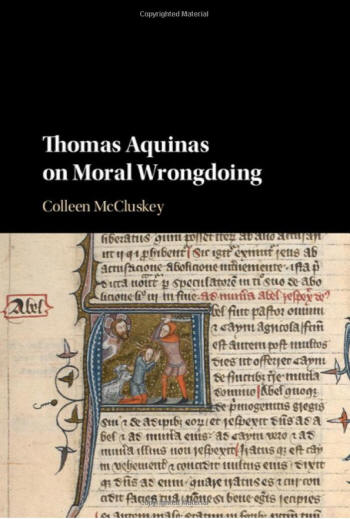Book Review
Thomas Aquinas on Moral Wrongdoing
Colleen McCluskey
Cambridge university Press (24 Nov 2016)
ISBN:
978-1107175273
 Here
we have an overall assessment of the explanation proposed by Aquinas on
moral wrongdoing, including wrong actions in terms of defects in human
capacities and his theory of human vices. The work also takes in Aquinas's
theory of human action and the result is an excellent explanation of
Aquinas's psychology. It proved a helpful and insightful read.
Here
we have an overall assessment of the explanation proposed by Aquinas on
moral wrongdoing, including wrong actions in terms of defects in human
capacities and his theory of human vices. The work also takes in Aquinas's
theory of human action and the result is an excellent explanation of
Aquinas's psychology. It proved a helpful and insightful read.
The author notes that for Aquinas, we have no rational desire to do evil. Thus when we do evil, because we desire what is good, we therefore commit ourselves to the pursuit of something that is good in itself but is bad for us as rational beings. Aquinas takes our evil actions very seriously: we cannot blame them on things that are extraneous to ourselves. They come from within.
So we do things that are wrong while desiring what is good. Our intellects lack completeness: only God has completeness of intellect and only God can will no evil. Goodness implies a right ordering of relations: of the will to reason and the person to God.
There is a certain sense in which intellect trumps will for Aquinas. However, says the author, the root and source of moral wrongdoing is to be sought in the act of the will. It is the source of action and wrongdoing is bad action. However, there could be a problem in the intellect or the sensory appetite that accounts for the lack of direction in the will.
Aquinas is willing to grant that ignorance may play a role in all forms of wrongdoing. Wrong actions that originate in the intellect are classified as sins of ignorance. As a result of ignorance that originates in the intellect," the agent makes a judgement of what to do based on incomplete or erroneous information. The content of the judgement is submitted to the will, which moves the agent to perform the particular action." So, the immoral action has its origin in the intellect, while its ultimate source is in the will. This is because it is the will that produces the action.
Deficits in the intellect, the will and the sensory appetite are what Aquinas calls internal causes of wrongdoing. The external cause cannot be God because God is good and cannot will evil. Other human beings cannot be sufficient causes of wrongdoing and nor can the fallen angels. Blameworthiness rest in the capacities within the agent: "For Aquinas, only entities that possess a principle of motion internal to themselves by virtue of which they are self-movers are capable of acting with any degree of voluntariness."
A really helpful development of these reflections would be in relation to those with severe mental illness who possibly lack free will. This proved a very useful and helpful read.
Reviewed by Dr Pravin Thevathasan
